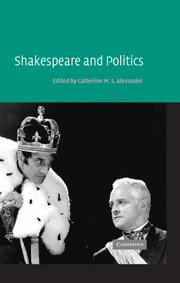Book contents
- Frontmatter
- Contents
- List of contributors
- Editor's note
- 1 Shakespeare and politics: an introduction
- 2 Shakespeare and politics
- 3 Henry VIII and the deconstruction of history
- 4 Livy, Machiavelli, and Shakespeare's Coriolanus
- 5 Richard II and the realities of power
- 6 Plutarch, insurrection, and dearth in Coriolanus
- 7 Some versions of coup d'état, rebellion, and revolution
- 8 Language, politics, and poverty in Shakespearian drama
- 9 ‘Demystifying the mystery of state’: King Lear and the world upside down
- 10 Venetian culture and the politics of Othello
- 11 The Bard and Ireland: Shakespeare's Protestantism as politics in disguise
- 12 Henry V as working-house of ideology
- 13 ‘Fashion it thus’: Julius Caesar and the politics of theatrical representation
- 14 Take me to your Leda
- 15 Macbeth on film: politics
- 16 William Shakespeare's Romeo + Juliet: everything's nice in America?
- Index
6 - Plutarch, insurrection, and dearth in Coriolanus
Published online by Cambridge University Press: 05 June 2012
- Frontmatter
- Contents
- List of contributors
- Editor's note
- 1 Shakespeare and politics: an introduction
- 2 Shakespeare and politics
- 3 Henry VIII and the deconstruction of history
- 4 Livy, Machiavelli, and Shakespeare's Coriolanus
- 5 Richard II and the realities of power
- 6 Plutarch, insurrection, and dearth in Coriolanus
- 7 Some versions of coup d'état, rebellion, and revolution
- 8 Language, politics, and poverty in Shakespearian drama
- 9 ‘Demystifying the mystery of state’: King Lear and the world upside down
- 10 Venetian culture and the politics of Othello
- 11 The Bard and Ireland: Shakespeare's Protestantism as politics in disguise
- 12 Henry V as working-house of ideology
- 13 ‘Fashion it thus’: Julius Caesar and the politics of theatrical representation
- 14 Take me to your Leda
- 15 Macbeth on film: politics
- 16 William Shakespeare's Romeo + Juliet: everything's nice in America?
- Index
Summary
The rising of the peasants has gone on growing from day to day to such an extent that they only required a leader to make it formidable and open rebellion.
(Venetian Ambassador to England, to the Doge and Senate, 26 June 1607)Back in 1876, an anonymous critic in The Cornell Review pronounced Coriolanus ‘biography dramatized’. Brander Matthews said much the same thing about the play in 1913: ‘Shakespeare rarely contradicts Plutarch whereas he often contradicted Holinshed; he speeds up Plutarch's passage of time, however, and makes no attempt to recreate the ancient world.’ For John W. Draper in 1939, Plutarch's story is retold in Coriolanus in contemporary terms. Recently, in 1996, David Farley-Hills has repeated the idea that ‘the sources of Coriolanus are … followed with considerable fidelity, with only those changes that help convert prose narrative into effective verse drama’.
Certainly Shakespeare followed the main events of Plutarch's ‘Life of CaivsMartius Coriolanus’: the citizen unrest in Rome, the war with Corioli, Coriolanus's standing for consul, his opposition to the tribunes and free corn, the mob violence, his trial and banishment, his alliance with the Volscians and attack on Rome, the embassy of women, his yielding to Volumnia, and assassination in Antium. Yet in Acts 1 and 3, particularly, Shakespeare added current and exciting material from 1607–8.
- Type
- Chapter
- Information
- Shakespeare and Politics , pp. 110 - 129Publisher: Cambridge University PressPrint publication year: 2004
- 2
- Cited by

